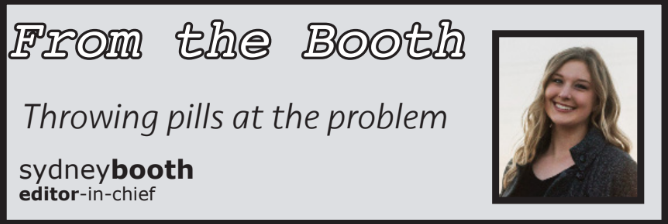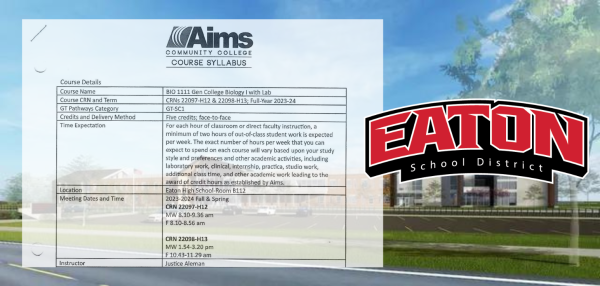Throwing pills at a problem
In case you have not noticed, this newspaper is not your typical end of semester “let’s hear it for Christmas” type of newspaper. This season, I am very proud of the Red Ink staff as a whole for writing about topics that are meaningful and pressing.
Topics like suicide and depression will always be relevant. This past year has been a year of mourning for the Greeley community after three suicides. There is no question that mental illness and depression plague our society and that people need to be informed on the issue.
According to the American Psychological Association, depression as defined by the Diagnostic and Statistical Manual (DSM) as “a debilitating depressed mood or loss of interest in daily activities for a least two consistent weeks,” and must be accompanied by a major depressive episode that occurred in the past twelve months.
According to the Anxiety and Depression Organization of America, other symptoms of depression include “decrease or increase in appetite, insomnia or hypersomnia, psychomotor agitation or retardation, constant fatigue, feelings of worthlessness or excessive and inappropriate guilt, recurrent thoughts of death and suicidal ideation with or without specific plans for committing suicide, and cognitive difficulties, such as, diminished ability to think, concentrate and make decisions.”
However, as common as all these symptoms may appear, studies have shown that depression is over diagnosed. I would argue that our culture has simply been throwing pills at the real problem. According to an article from The Atlantic, which includes figures from a Johns Hopkins Bloomberg School of Public Health study, over the course of 20 years, the U.S. has seen a 400 percent increase in antidepressant use. In reality, just over 60 percent of adults previously diagnosed with depression by a clinician did not meet the official criteria for the depression upon re-evaluation in the study.
Overmedicating a large portion of the nation is not getting at the heart of the problem. People feel sad, go to a doctor, and the doctor gives them medication to “increase quality of life.” We give people pills and tell them to be happy again. “Depressed” teenagers, are not being taught how to cope with anxiety and stress.
I have been fortunate enough to have an amazing family. I have always known there are places for me to turn if I need help or someone to talk to. However, that cannot be said for every teenager or every person in general. So many students are battling bottled-up emotions. They’re stressed and sad with nowhere to turn, so society just tells them they’re depressed without giving them any tools to overcome it. For some people, that’s all they need to remain exactly where they are: stuck in a cycle of prescription medication.
That’s the point of this issue you’re reading right now. Red Ink wants to talk about things that matter, and hopefully, give those who need it somewhere to turn. Students at EHS need to know they are not alone in their struggles. So Merry Christmas from the Red Ink staff. We realize that holidays can be a hard time for many people for a myriad of reasons, and sometimes the best gift you can give someone is a listening ear.








